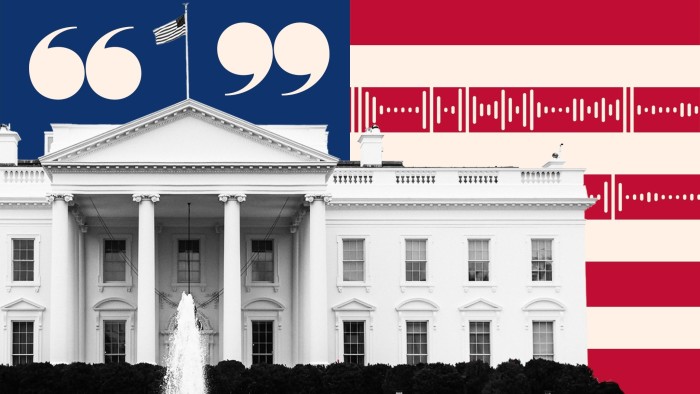Unlock the US Election Countdown newsletter for free
The stories that matter on money and politics in the race for the White House
It is a pity that we had to wait for investment analysts to spell out the effects of Donald Trump’s trade plans. Joe Biden’s campaign should be ramming it down American throats every day. That Trump’s impact on US democracy is uppermost in Biden’s mind is natural. But it is crowding out what preoccupies more voters. The bottom line, according to Moody’s Analytics, is that Trump’s policies would trigger a recession by mid-2025. Unemployment and inflation would jump. The bottom half of US income distribution would suffer the most.
But that is only the half of it. Moody’s based its forecast on Trump’s long-standing plan to impose a 10 per cent tariff on all imports and 60 per cent on goods from China. Those are costly enough. The average family would pay $1,700 more a year in higher prices, says the Peterson Institute for International Economics. A Republican spokesperson insisted that this was fake news: “The notion that tariffs are a tax on US consumers is a lie pushed by outsourcers and the Chinese Communist party,” she said. Republicans have come full circle. It is now communist to argue for trade.
Democrats are not that far behind. The two great points of consensus in today’s US are that globalisation is toxic and that America is in a zero sum competition with China. This is partly what inhibits Biden from tackling Trump’s trade war plans full on. But Trump is making it easier for Biden all the time. Earlier this month, the former president spelt out an “all tariffs policy” in which import duties would fully replace income tax.
It is impossible to arrive at an optimal tariff that could compensate for abolishing tax revenues. The higher the rate, the greater the disruption to trade. It would be like a dog chasing its own tail. The economic costs of reverting to a 19th-century fiscal policy would fall dramatically on blue-collar workers and their families — the type of people who are increasingly shifting to Trump. The beneficiaries would be the rich, who pay a far lower share of their income on goods. A Moody’s study on this would surely forecast a depression.
Have your say

Joe Biden vs Donald Trump: tell us how the 2024 US election will affect you
On top of Trump’s latest plan should be added the “full decoupling” with China that Robert Lighthizer, Trump’s former trade representative, and his likely next Treasury secretary, is pushing. There is also Trump’s well-advertised plan to replace Jay Powell as chair of the US Federal Reserve. All of this adds up to higher borrowing costs, soaring inflation and a decisive shift towards deglobalisation. In short, Trump is presenting an ever bigger target for Biden to shoot at. The US president might take aim during the two men’s first presidential debate on Thursday night.
The question arises about what a Biden second term would mean for the global economy. The US president has yet to spell out the difference between “de-risking” and “decoupling”. That is because it is so hard to draw the line. If any Chinese trade surplus can theoretically be invested in its growing war machine, then why stop at semiconductors and artificial intelligence technology? Until Biden can specify sharper parameters it will be hard to reach a common position with the EU on China.
In short, both Biden and Trump are vowing to travel in the same direction. But Trump would do so in leaps and bounds. The irony of Trump’s position is that he is the candidate promising to end US involvement in the “forever wars” in Ukraine and the Gaza strip and may even consider abandoning Taiwan — though it is impossible to forecast where his capricious mindset would lead him. Yet his plans to disengage from the global economy would make conflict with China more likely.
The one plus point of today’s unfolding cold war is that China is deeply invested in the global status quo. By contrast, the US had scant economic blackmail power over the Soviet Union during the first cold war. It is a deficiency of today’s foreign policy debate that so few are arguing the merits for retaining America’s leverage over China. The focus is over the degree and speed of US disengagement. On that measure, Trump is very much the disrupter.
What we know about Trump’s plans is they would trigger recession. What we think he would be sorely tempted to do could lead to depression. The economic consequences of Trump would be a disaster. The unintended geopolitical ones could be even worse. Biden’s America is sleepwalking into a cold war with China. Trump is embracing the nightmare. The best thing Biden could do for his prospects is to drive home what that would mean for middle America’s bottom line.


